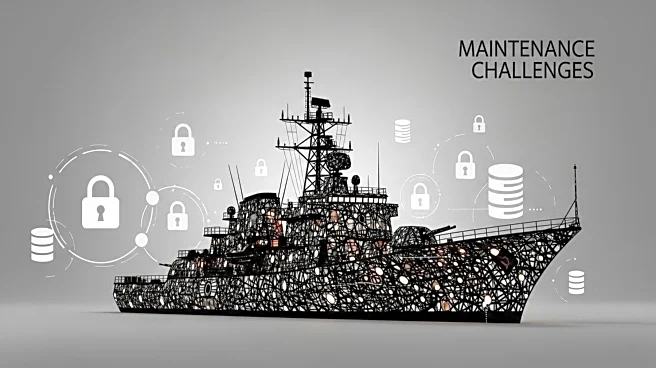What's Happening?
The Government Accountability Office (GAO) has reported significant challenges faced by the Pentagon in maintaining critical U.S. Navy systems due to vendor lock-in and lack of intellectual property rights. The GAO highlights that the Pentagon does not own the necessary IP rights for spare parts and repair instructions, making it dependent on original equipment manufacturers (OEMs) for inventory and delivery timelines. This dependency has led to delays in maintaining systems such as the F-35 fighter jets and Virginia-class attack submarines. The GAO found that existing Pentagon guidelines for IP and data rights are insufficient for long-term sustainment, with none of the studied programs fully incorporating these policies. The report suggests that the complexity and volume of data deliverables make it challenging for Navy program staff to evaluate and utilize the information effectively.
Why It's Important?
The issues identified by the GAO have significant implications for U.S. military readiness and operational efficiency. Vendor lock-in restricts the Navy's ability to perform timely maintenance, potentially compromising the readiness of critical defense systems. This dependency on OEMs can lead to increased costs and delays, affecting the overall effectiveness of military operations. The GAO's recommendations to change laws and revise Pentagon policies could lead to improved access to necessary data, enhancing maintenance capabilities and reducing reliance on external suppliers. Addressing these challenges is crucial for maintaining the operational readiness of the U.S. Navy and ensuring national security.
What's Next?
The GAO has proposed legislative changes requiring contractors to provide more detailed manufacturing and process data as part of procurement contracts. Additionally, the Pentagon is advised to revise its policies and procedures regarding IP acquisition. These steps aim to reduce vendor lock-in and improve the Navy's ability to maintain its systems independently. The implementation of these recommendations could lead to more efficient maintenance processes and better preparedness for future military operations.
Beyond the Headlines
The GAO's findings highlight broader issues related to intellectual property rights and defense procurement. The reliance on OEMs for critical data underscores the need for more robust IP policies within the Pentagon. This situation raises ethical and strategic concerns about the control and ownership of military technology, potentially affecting the U.S.'s ability to innovate and maintain technological superiority.









